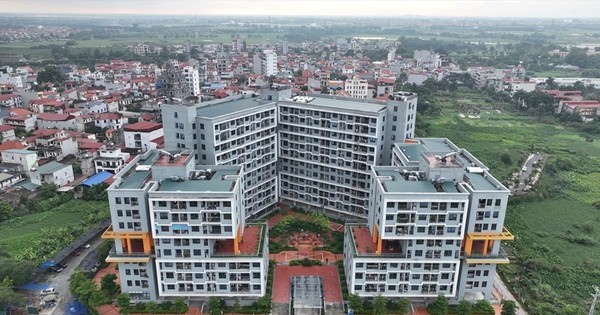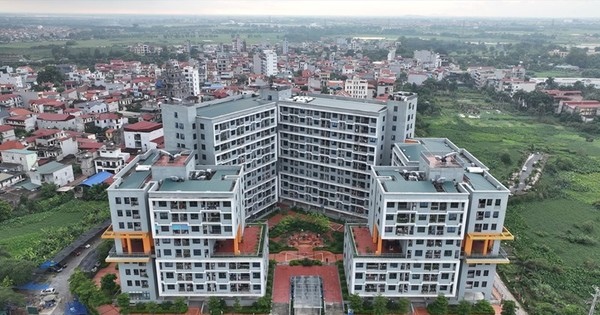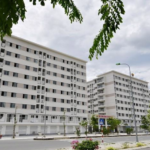At the seminar “Unraveling the Knot, Preventing Policy Abuse in Social Housing,” Mr. Ha Quang Hung, Deputy Director of the Housing and Real Estate Market Management Department of the Ministry of Construction, stated that first and foremost, we need to clarify what constitutes a reasonable price for social housing. According to current legal regulations, the allowed selling price of social housing takes into account the full cost structure, which varies for each project.
“For instance, if we already have a clean land fund and are constructing a social housing building, the price will essentially cover only the construction cost of that building. However, if the project is an independent social housing development that requires the investor to develop technical and social infrastructure, these costs will be included in the selling price. Even though land use fees for both types of projects are waived by the state, the expenses incurred differ,” explained Mr. Hung.
 Mr. Ha Quang Hung, Deputy Director of the Housing and Real Estate Market Management Department (Ministry of Construction), asserted that while the prices set by enterprises have increased significantly compared to the past, they are still considerably lower than those of commercial housing. |
According to Mr. Hung, the cost of social housing with comprehensive and synchronized technical infrastructure will be higher compared to constructing just a residential building. Additionally, even though land use fees for social housing projects are waived by the state, in cases where land clearance, compensation, and resettlement are necessary, these expenses will be factored into the cost if the state does not support the enterprise. Consequently, the price will be higher compared to projects with readily available clean land.
Mr. Hung affirmed that if the locality allocates clean land to be handed over to the state for investment, along with investing in synchronized technical and social infrastructure connected to the land area for social housing development, the selling price of social housing apartments will be lower compared to cases where the investor has to spend their own money.
“In reality, there may be cases where the selling price of social housing is not determined correctly according to regulations. For example, the allocation of profits between commercial and social housing may be inappropriate, or the regulated profit margin for social housing projects may exceed the allowed 10%. We can entirely control this through state management, specifically through independent auditing by entities like the State Audit Office, the Department of Construction, and the Department of Finance,” said Mr. Hung.
Mr. Hung further elaborated that the recently passed resolution on social housing requires investors to proactively apply the methods for determining the selling price of social housing as stipulated by law. However, investors must hire a capable consulting unit to appraise the selling price before making any announcements.
Once the project is completed, the investor must still engage an independent auditing unit, and the State Audit Office will audit the projects using public investment capital. The auditing results will be sent to the Department of Construction to determine whether the selling price complies with the regulations. There are also sanctions in place if the investor sells at a price higher or lower than the approved price; the investor is not allowed to collect additional payments.
“I believe that this regulation provides flexibility for investors while reducing the workload for local state management agencies, ensuring transparency and fairness for investors and buyers, allowing them to access products at appropriate prices,” stated Mr. Hung.
Mr. Hung added that another reason for the recent price increases is that enterprises are starting projects and calculating prices based on practical costs in the market, including prolonged implementation, management, operation, and borrowing costs. As time goes on, these costs increase.
Moreover, input costs such as labor, materials, and supplies, especially scarce resources, can double in price. Enterprises must consider these factors when initiating projects at this time.
The Housing Authority leader asserted that while the prices set by enterprises have increased significantly compared to the past, they are still considerably lower than those of commercial housing.
Ngoc Mai
– 06:06 07/01/2025
The Ultimate Guide to Buying Into the Hottest Social Housing Project: Why Hundreds Are Lining Up
Amidst the scorching sun, a serpentine queue of eager prospective homeowners formed for the An Trung social housing project in Son Tra District, Danang. Dedicated applicants shared that they had been waiting since the previous afternoon, the 29th of June, to secure their place in the lottery for submission order.
Real Estate Firms in a Flurry Over 5.4% Land Use Tax Backcharge
The housing market is at a critical juncture. Businesses warn that if the current supply constraints are not addressed promptly, the market will remain stagnant, negatively impacting the wider economy.
Transforming Land Usage: A Hefty 300% Rise in Fees
The new land pricing policy has resulted in a significant increase in taxes for those wishing to change their land usage. With a 250-300% surge in taxes for converting agricultural land to residential use, many individuals are now facing financial challenges due to the substantial rise in land use conversion costs.





















